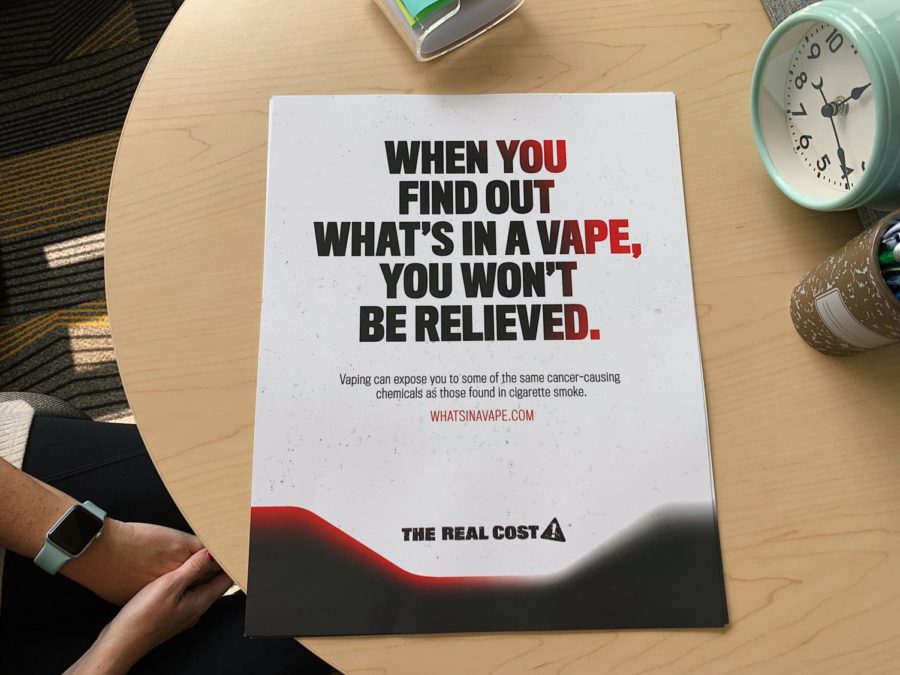The Juul epidemic: Up in smoke
“The Real Cost” creates ad campaigns to warn against the consequences of vaping.
A teenage boy raises his hand in his second-period science class and asks to use the restroom as his left hand grasps the Juul in his pocket. The oblivious student is unaware of the chemistry experiment that will occur in his lungs during his second-stall vaping session.
The health risks of vaping are becoming more and more apparent as cases of respiratory illnesses have been linked to vaping. As of Sept. 16, seven people have died from severe respiratory illnesses in connection to vaping.
According to NBC News, “Forty-four state health departments overall have reported investigations into more than 500 possible cases” of respiratory illnesses caused by vaping.
The original intent for e-cigarettes and vaping products was to aid addicted smokers in the process of quitting. This purpose has changed drastically as the number of teenagers using these products has increased. Lawsuits have been filed against companies such as Juul Lab for directly marketing to minors.
According to CBS News, “The lawsuit argues that beginning in the 1990s, adolescent smoking rates began to fall, only to sharply rise due to a combination of Juul Lab’s nicotine delivery technology as well as its innovative social media campaign targeting teens through ‘advertisements, hashtags and paid influencers.’”
The Trump Administration plans to ban all non-tobacco flavored vaping products in an attempt to reduce the underage use of these products. According to NBC News, the availability of fruity flavors is what is luring many teenaged and young-adult users.
The dangers of vaping and the use of vaping products have been plastered onto every school hallway and pack of Juul pods. These warnings have been continuously ignored by teenagers. Junior Angelo Ognianov believes that many teenagers disregard the risks because of the appeal of vaping.
“[Teenagers] continue to use them because they like [vaping]. They definitely know it is causing health risks, but they don’t seem to care,” Ognianov said.
There are also teenagers who are using this new evidence as a wake-up call. Student Assistance Coordinator Diana Benoist shared that students have come to her with their concerns.
“I’ve talked to a couple of students actually who have come forward recently and have asked for some help. … They are reading and hearing about what is happening with respiratory illnesses, and things like that related to vaping, and they are scared,” Benoist said.
At DGS Benoist is a confidential resource for students. Students are able to confide in her and receive help without fear of punishment. She aids students in overcoming their addictions and gives them the resources they need to be successful.
“If a student comes in and tells me they’re struggling with vaping or nicotine addiction, they can have a confidential conversation with me about that. They don’t have to worry about me walking them over to the dean’s office, me searching them or me calling home right away,” Benoist said.
The vaping epidemic continues to plague today’s society with increasing numbers. Junior Mimi Nieves believes that continuing to inform teenagers about the risks involved with vaping is the best way to beat this crisis.
“I feel like many people have already decided to make their choices [about vaping], but that with more information, [they] might change their ways,” Nieves said.
There are resources available for DGS students looking for support. Benoist encourages any students to reach out to her.
“My goal really is to help [students] set some goals for themselves to reduce their use [of vaping products] and to help them be safe. … I definitely encourage students to come see me if they have questions or concerns about [vaping],” Benoist said.


